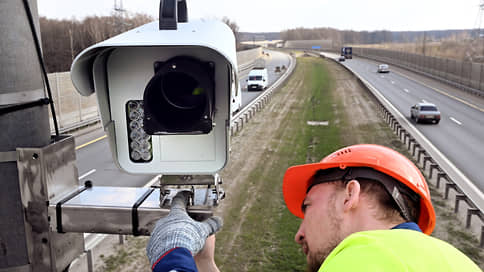Cameras switched to strict regime – Kommersant
[ad_1]

The State Duma adopted in three readings a law developed on behalf of the President of the Russian Federation, designed to protect the rights of car owners. A closed list of grounds for the installation of complexes for automatic fixation of violations, mandatory warning about cameras, coordination of locations with the traffic police and other rules have been enshrined at the legislative level for the first time. In conjunction with this bill, according to Kommersant, amendments to the Code of Administrative Offenses will also be adopted.
Today, the rules for installing and using traffic cameras are described in GOST and the recommendations of the Ministry of Transport – these documents are optional for use, drivers cannot refer to them when appealing fines. Adopted on Thursday government document introduces legislative regulation of the process.
First of all, an exhaustive list of ten reasons for installing a camera on a particular section of the road is fixed. Among them:
- accident-prone areas (where during the year there were three accidents of the same type with victims or five different types);
- places of production of road works; areas where stopping and parking are prohibited;
- bus lanes, intersections and pedestrian crossings, as well as places determined by the traffic police.
The reason for the introduction of control will also be the fact that earlier at the intersection there were four (or more) minor accidents without victims. Outside the city, the camera control zone should not begin closer than 150–300 m after the warning sign, in a populated area – no closer than 100 m after the sign.
The amendments mention some “means of organizing traffic” to refer to the cameras, which the government will describe in a separate document, which is still unknown. The installation of the complex will be coordinated with the traffic police, the owner of the road and local authorities. Mobile cameras will be redeployed after the “cease of circumstances” that caused them to be installed (for example, after the completion of road works or after the decrease in accidents). The decision to dismantle the stationary camera is made by the owner of the road, local authorities and the traffic police.
Local authorities will be required to provide the Ministry of Internal Affairs with accurate data on the installation of cameras and a list of recorded violations – this information should be posted online. With the entry into force of the law, it will be possible to appeal against a fine with a chamber not designated according to the rules. The obligation of the region to finance the costs of maintaining cameras (including postage for mailing fines) and transfer photo and video materials to the traffic police is fixed.
The amendments were drawn up in the form of amendments to the second reading to the law on highways (257-FZ) and were adopted immediately in the third reading – without discussion.
At the stage of the first reading (in 2018), it was proposed to oblige the regions to conduct a “traffic safety audit”, but this was abandoned. But a block about complexes appeared – it was introduced by deputies and the White House. The traffic police took part in the development of the document.
Yevgeny Moskvichev, head of the State Duma Transport Committee, told Kommersant that the bill was developed in pursuance of the President’s order. We are talking about the instruction in 2019 to create uniform rules for installing cameras and canceling fines issued with violations of these rules. According to Mr. Moskvichev, experts, camera manufacturers, social activists and representatives of the regions worked on the text. In conjunction with the adopted law, the deputy added, amendments to the Code of Administrative Offenses should be adopted, excluding the imposition of fines (or the abolition of those already imposed) from cameras installed or marked not according to the rules. Such a bill (authored by MPs Dmitry Vyatkin, Senator Irina Rukavishnikova) was adopted by the State Duma at the end of 2021 in the first reading, “Kommersant” told about him.
According to the traffic police, as of January 1, 2022, there were 23.8 thousand stationary and 3.2 thousand mobile cameras in the Russian Federation. 90% of all administrative fines for traffic violations (183.6 million) were issued last year with the help of road complexes.
The amendments come into force on September 1, 2024. The complexes installed before this date will be allowed to be used if this does not contradict the new law, otherwise they must be turned off and dismantled. “We are giving a year for the owner of the road to eliminate all violations,” Yevgeny Moskvichev told Kommersant.
The OKO association (which unites camera manufacturers and operators of photo and video recording systems) conceptually supported the bill, drawing attention to “a number of imperfections.” For example, it does not allow, in the event of a hotbed of accidents, to install the camera immediately as a “preventive measure,” the organization explains: you need to wait until the required number of accidents “accumulate” during the year. “The possibility of installing complexes near schools, kindergartens and other places of social attraction is not provided for,” the association continues. 20) km/h. Pedestrians are left unprotected.” “The law leaves unresolved the key problem that entails the punishment of innocent drivers for other people’s or imaginary violations — the lack of a requirement for scientifically based methods for examining auto-fixing materials for errors,” adds Grigory Shukhman, an expert on violation fixing systems.
In the capital’s TsODD (in Moscow there are 3.8 thousand cameras), Kommersant said that they already comply with the requirements of GOST and the methodology of the Ministry of Transport (complexes are installed in emergency places, places are coordinated with the traffic police, etc.), so the new law on the work of the city photo and video recording system will not be affected: “We install cameras only if we are sure that they will really increase security.”
[ad_2]
Source link








